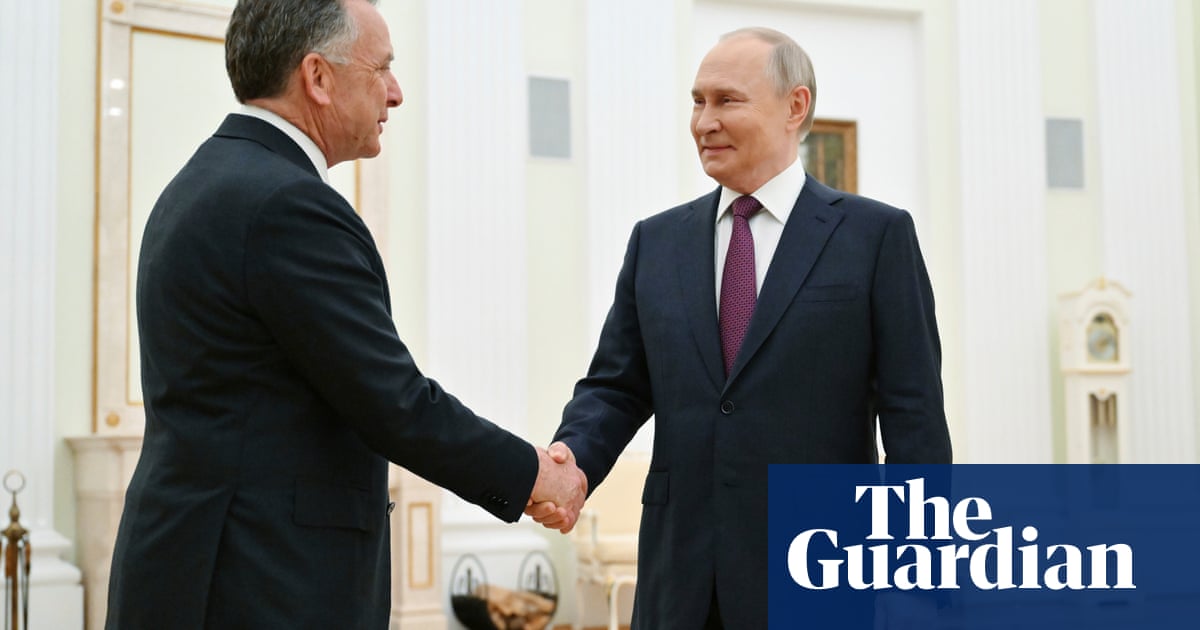“Crimea will stay with Russia,” Donald Trumptold Time magazinein a largely sympathetic profile on Friday. And with that statement, the US president made clear that he wanted to carve up another country, Ukraine, and so legitimise the forcible seizure of land made by Moscow 11 years ago.
From reading the transcript of the interview, Trump’s thinking is hardly coherent. Crimea, he says, wouldn’t have been seized if he had been president in 2014, but “it was handed to them by Barack Hussein Obama” and now Crimea has “been with them [Russia] for a long time” – so it is time to accept the seizure.
The president does not even pursue the argument that a recognition of Russia’s occupation of Crimea is a necessary price of ending Russian military assault onUkraine, though perhaps he thinks it – and instead the conversation is moved on by the reporters to discussing Trump’s aspirations for annexing Greenland and Canada. “The only way this thing really works is for Canada to become a state,” he added.
Wars seldom end satisfactorily. The struggle, violence and sacrifice often does not bear the promised fruit. Invaded suddenly by Russia, Ukraine fought off the capture of Kyiv and existential collapse in the spring, summer and autumn of 2022 but has been unable to expel the attackers since, leaving Kyiv facing the reality of Russia occupying about 18% of its territory.
But the proposed US settlement term sheet –now in the public domainand verified by Trump’s comments about Crimea – is redolent of great power thinking at the end of previous wars: the carve-ups of Versailles in 1919, where a country that had only been narrowly defeated was treated as if it were conquered, or Potsdam in 1945, which divided Europe into west and east.
Ukraine’s own peace plan –an older version of which was also leaked on Friday– tries a different tack: a full ceasefire on the current frontlines first, then a discussion about territories later. It is not the conversation that the US or Russia want to have, but Kyiv argues, with European support, that peace should be rooted in international law, not capitulation. Agreements unjustly imposed do not endure.
The difficulty for Kyiv is, first, that it is the US proposing to give “de jure recognition of Russian control of Crimea” – so, a direct agreement with Russia. The second is that if Ukraine were determined to fight on, and hope that Trump would walk away, it risks losing military intelligence again – and the US may not sell Kyiv critical weapons such as Patriot air defence missiles.
Russia, meanwhile, is responding with a series of increasingly aggressive punishment bombings aimed at Ukrainian civilians.Nineteen were killed when a children’s playground in Kryvyi Rih was bombedon 4 April;35 died in a morning missile attack on Palm Sunday, 13 April, in central Sumyas families promenaded into town. Three more died overnight in Pavlohrad when a drone hit an apartment block.
This suggests a growing confidence that Russia will not be punished for starting a war, while Trump makes simple demands on social media for the war to stop. On Thursday,the US president said “Vladimir, STOP!”after 12 were killed by Russian bombing in Kyiv, and he complained that “5,000 soldiers a week are dying” – an exaggeration and more importantly a false equivalence.
Sign up toThis is Europe
The most pressing stories and debates for Europeans – from identity to economics to the environment
after newsletter promotion
Western officials estimated that 250,000 Russian soldiers have been killed during the three-year invasion, their deaths often caused in crude infantry assaults ordered by Moscow’s commanders against Ukraine’s frontlines. Meanwhile, Kyiv acknowledged the deaths of 46,000 of its own troops in mid-February, so together the total military fatality rate is less than 2,000 a week.
For all the Russian aggression and the casualties it has caused, the proposed US peace terms say that while Ukraine should be compensated somehow, all sanctions on Russia going back to 2014 should be removed and Washington and Moscow should engage in “economic cooperation on energy and other industrial sectors”. So not just a carve-up, but a rapprochement that Ukraine cannot prevent.
Peace discussions do more than end wars. They often set diplomatic standards for the period thereafter. Perhaps there will be last-minute changes, but the warmer tone of the US-Russia discussions compared withTrump’s beratings of Zelenskyydoes not engender much hope. Ukraine’s options – fight on and risk losing the US, or accept a formal loss of Crimea – are not attractive, even if the latter may pave the way to a ceasefire.
